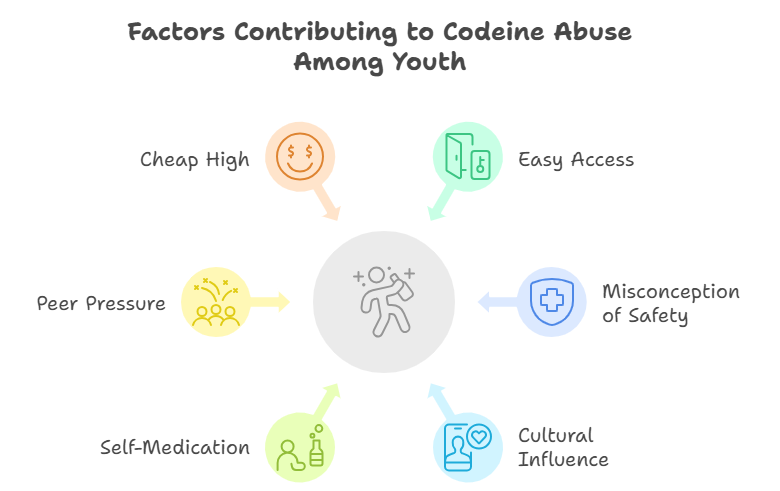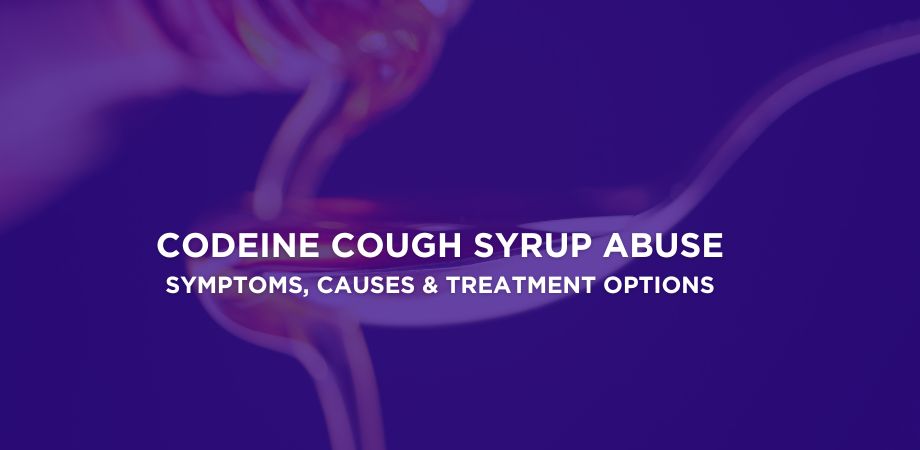Codeine is an analgesic opioid that is commonly found in prescription cough suppressants and has become a significant substance of abuse globally. It is medically prescribed for cough relief; however, its depressant properties affect the central nervous system. This creates an euphoric feeling, making it a target for recreational misuse. It is popular among teens who want to easily achieve a high at a cheap cost. The abuse usually involves the mixture of the syrup with soft drinks or alcohol and is commonly referred to as purple drank or sizzurp.
The trend of using codeine syrup to get high is very concerning for health officials. Unlike other illicit drugs, codeine cough syrup can be easily obtained in household cabinets, from friends, or through lax prescription oversight. This is why many youth consider it to be a safer way of getting high. However, the dosage can rapidly go up and can lead to physical dependence, cause a health crisis, or even overdose.
The 2022 National Survey on Drug Use and Health in the US found that 1 in 4 people aged 12 or older misused codeine products. In India, a study by the Regional Medical Research Center in Dibrugarh reported 26.5% of individuals seeking treatment for codeine abuse.
Codeine cough syrup abuse is a major issue at hand and has some serious consequences. Let’s learn more about it and how to tackle the problem before it turns into a major crisis.
What are the Causes of Codeine Cough Syrup Abuse Among the Youth?
The reason why a number of young people turn to codeine cough syrup may include numerous factors. These factors include
- Easy Access: Codeine cough syrup is easily accessible at home or with friends. The young generation may resort to stealing to attain a high. Additionally, they can easily forge a doctor’s prescription to get the drug. Apart from this, it can be purchased illegally from dealers on the internet.
- Misconception of Safety: Since the cough syrup is bought from a pharmacy, there is an understanding that it is safer than illicit street drugs.
- Cultural Influence: Codeine abuse has been normalised in culture, especially on social media. This has created an impression that it is a harmless substance.
- Self-Medication: Youth resort to codeine syrup to cope with emotional unrest, depression, anxiety, or stress. Some may consume it to escape from boredom or their current situation.
- Peer Pressure: Some youth may use codeine due to peer pressure to be part of a group or as an experiment to appear cool.
- Cheap High: Codeine offers a feeling of euphoria and relaxation, similar to opioids at a lower cost.

What are the Signs of Symptoms of Codeine Abuse?
It is important to identify the physical and behavioral signs to tackle the abuse of codeine in cough syrups by the youth. The common signs of abuse include:
Physical Signs and Symptoms
- Appearing unusually tired or drowsy
- Constricted/pinpoint pupils
- Slurred speech or poor coordination
- Nausea, vomiting, or itching
- Chronic constipation
- Blue tinge on lips and fingernails
- Low blow pressure
- Constant seizures
Behavioral Signs and Symptoms
- Secretiveness and isolation from friends and family
- Neglecting personal hygiene or grooming
- Drop in school grades, missing work, or family responsibilities
- Significant weight loss
- Visiting multiple doctors to get drugs
- Discovering empty cough syrup bottles
- Intense cravings to use despite its negative consequences
Dangers of Codeine Cough Syrup Abuse
Codeine cough syrup abuse can cause severe health problems and issues in an individual. The dangers include:
- Respiratory Depression: Codeine is an opioid that slows down the functioning of the central nervous system. When the cough syrup is mixed with alcohol or other depressants, it slows breathing, leading to overdose, coma, brain damage, or death
- Overdose: The mixing of codeine syrup with alcohol and CNS depressants, like benzodiazepines, is dangerous. The mixture of this deadly cocktail can lead to a dangerous overdose or death.
- Liver Damage: Codeine cough syrups are usually formulated with paracetamol. The combination of these two components creates a significant increase in analgesia. The repeated use can be toxic to the liver and can cause liver failure or death.
- Addiction: Codeine is an opioid and has a high chance of becoming an addiction. Regular misuse can lead to tolerance and may require a higher dose to get the same high. This will eventually accelerate the cycle of addiction.
- Dental Decay: The high sugar content of the cough syrup and the mixture, combined with dry mouth, can cause severe tooth decay.
- Withdrawal Complications: The sudden stopping of codeine syrup can cause painful withdrawal symptoms. This may include issues like vomiting, diarrhea, anxiety, muscle pain, and high blood pressure.
Why is Codeine Addictive?
Codeine works by binding to the opioid receptors in the brain and spinal cord. They influence the body’s pain-relief system, producing a feeling of euphoria and relaxation similar to opioids. The activation triggers a rapid release of dopamine in the brain’s reward system. Since the brain learns to identify the feeling of pleasure with the codeine cough syrup, it reinforces the compulsive nature to use the drug. All this fundamentally alters the brain structure, leading to the development of addiction.
Treatment for Codeine Cough Syrup Abuse
If codeine cough syrup abuse is detected, it is important to get them the right help. Recovery from substance abuse is possible with professional treatment. The treatment for it consists of
- Medical Detoxification: The first step to any drug-related treatment is medical detox. In this process, toxins are cleared from the body to minimize the physical harm caused by abuse. At the top rehab centers, like Alpha Healing Center, the patient is thoroughly cared for during this process until they regain their strength.
- Medication-Assisted Treatment (MAT): Medication is a good line of treatment to reduce cravings and lower the risk of relapse. Medications like methadone, naltrexone, and buprenorphine are used to tackle codeine abuse.
- Behavioral Therapy: Behavioral therapies are one of the best ways to tackle any form of addiction or abuse. These therapies help individuals understand the issues that cause the problem and help devise a path to recovery. Some common behavioral therapies used in the treatment include Cognitive Behavioral Therapy (CBT) and Motivational Enhancement Therapy (MET).
Is Codeine Cough Syrup Legal?
Yes, possession of codeine cough syrup is legal if you have a valid prescription, and the dosage must be as per the doctor’s instructions. In India, codeine cough syrup is classified under the Schedule H1 and Schedule H drugs under the Drugs and Cosmetics Act. Furthermore, the codeine cough syrup is regulated by the Narcotic Drugs and Psychotropic Substances (NDPS) Act to prevent potential misuse.
Frequently Asked Questions
Yes, codeine is addictive, and regular misuse can lead to physical tolerance and dependence. Once it influences the reward pathway of the brain, it can lead to addiction and painful withdrawal symptoms.
The mixture of codeine, which is an opioid, with alcohol or other drugs can cause profound sedation. This will rapidly increase the likelihood of respiratory problems, coma, or death.





